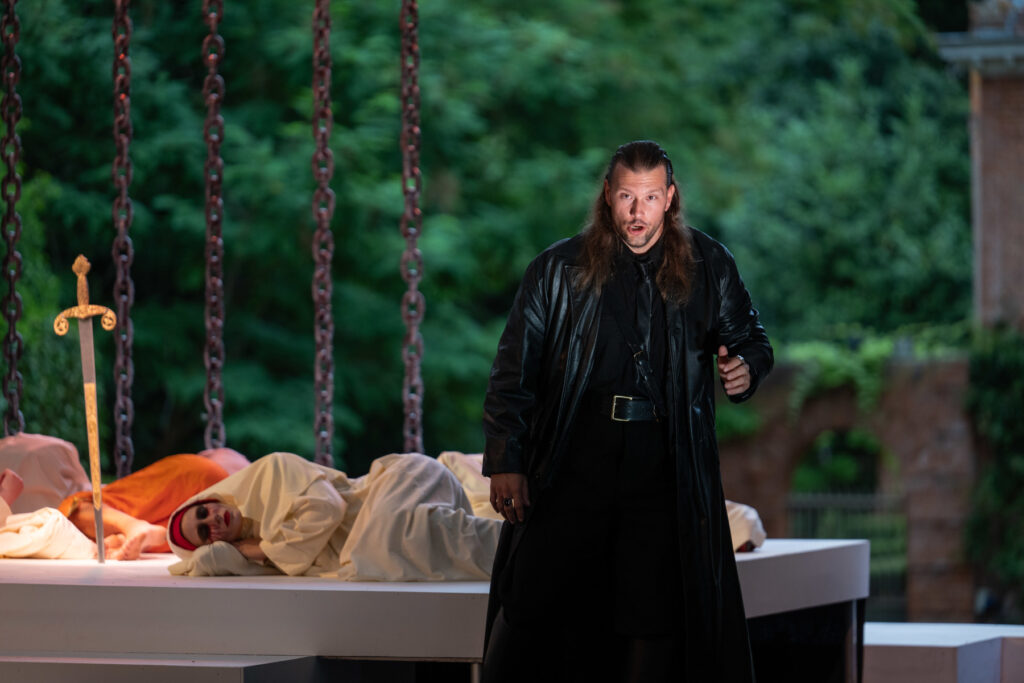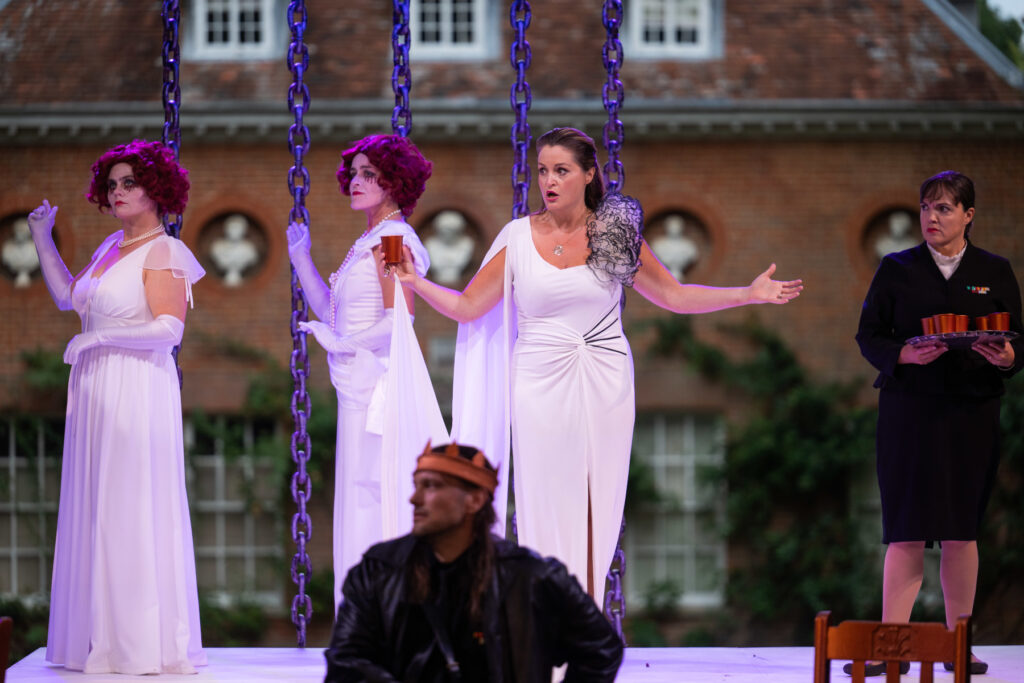In the capable hands of director and designer Richard Studer and conductor Jonathan Lyness, this production more than suggests that Verdi’s Macbeth can be performed with a reduced orchestra and minimal staging. Given the size of the auditorium and limited resources available at West Green, these two enterprising individuals didn’t have much choice. Both have many years’ experience creating pocket-sized productions, whether working together for Mid Wales Opera or in leafy Hampshire where, in the grounds of West Green House, Studer and Lyness have now celebrated a 25-year operatic partnership.
The magical realm that is West Green may not convey any brooding disquiet, convey a blasted heath or conjure Shakespeare’s Glamis Castle. But an open-ended stage is all Studer needs to suggest political ambition and a sense of impending danger. He makes do with a three-tiered dais, a curtain of suspended chains (its confinement and menace implicit) and half a dozen quilt-lined oblong structures each side of the stage that suggest empty coffins. All is simple and effective with jeopardy, if not duplicity, lurking throughout. Costumes combine contemporary and faux medieval: with power-dressed witches clad in tartan (more Vivienne Westwood than Edinburgh Woollen Mill), and soldiers garbed in black and jackbooted – suggestive possibly of a totalitarian state. Behind the stage lies West Green House, a grade 2 listed mansion built in the early 18th century by General Henry Hawley who had led the cavalry charge at the Battle of Culloden near Inverness in 1746.

So much for Scottish links, which might otherwise obscure the fact of there being more of a Welsh link in terms of those performing on stage, since this production is a close replica of that presented by Mid Wales Opera last year. As in that staging Canadian baritone Jean-Kristof Bouton fully inhabits the title role and brings accumulating guilt and torment as he succumbs to his wife’s persuasion and dreads the truth of the witches’ prophecies. His singing combines well-projected warmth and richness, adding a finely spun legato in his closing “Pietà, rispetto, amore”, where regret and disappointment are movingly conveyed. As Lady Macbeth, Mari Wyn Williams is all self-possession and naked ambition, fearlessly making good Verdi’s request for the role to be sung by “the voice of a devil”. Her opening cavatina “Vieni! t’affretto” brought a perfect balance between blade and velvet, and she sang with blood-freezing intensity in her brindisi, later dispatching a superbly clean high D flat in her ‘Una macchia è qui tuttora!
Elsewhere, supporting roles were well judged with Simon Wilding a fine, if occasionally effortful-sounding Banquo, but suitably noble; Thomas Elwin an effective Malcolm and Rebecca Afonwy-Jones impressing as the Lady-in-waiting. But it was the marvellously Italianate tenor of Robyn Lyn Evans who was outstanding as Macduff, excelling in his big moment when learning of the murder of his wife and children. Six witches were no less compelling, if at times more coquettish than intimidating, but they revelled in their respective scenes and held the eye and ear in well sung ensemble routines. There was plenty of vigour too from the soldiers and eight members of Mid Wales Opera Community Chorus who as Scots clansmen at Birnam Wood made the most of their limited appearance with a slow-motion battle sequence alongside Verdi’s stirring music. There was further use of decelerating time, again in Birnam Wood, when a procession of spirits and future kings held picture frames, adding to Macbeth’s mental agony.

Last, but not least, Lyness, conducting his own reduced orchestration, directed the 19 players of West Green House Orchestra with his usual flair, enabling those on stage to be given sensitive instrumental support, while underlining all the necessary dramatic tensions. This tragedy may not be chillingly supernatural, but there’s no absence of involving performances to underline the growing mania behind the central characters and their interactions with the witches, considered by Verdi to be one of the three main roles in the opera. Altogether, this staging succeeded in creating the maximum impression from the minimum of means.
David Truslove
Macbeth
Opera in four Acts by Guiseppe Verdi (1847 and performed in the 1865 version)
Libretto by Francesco Maria Piave & Andrea Maffei after the play by William Shakespeare.
Sung in Italian with English surtitles.
Cast and production staff:
Macbeth – Jean-Kristof Bouton; Lady Macbeth – Mari Wyn Williams; Banquo – Simon Wilding; Macduff – Robyn Lyn Evans; Lady-in-Waiting – Rebecca Afonwy-Jones; Malcolm – Thomas Elwin; Doctor – Jerome Know; Servant to Macbeth – Thomas Colwell; Assassin – Henry Saywell
Director & Choreographer – Richard Studer; Lighting – Sarah Dell; Mid Wales Opera Community Chorus; West Green House Orchestra; Conductor – Jonathan Lyness
West Green House Gardens, Hartley Wintney, Hampshire; Saturday 19 July 2025.
Top image: Scene from Macbeth
All photos © West Green House